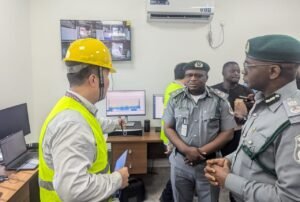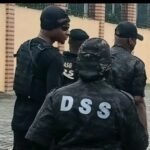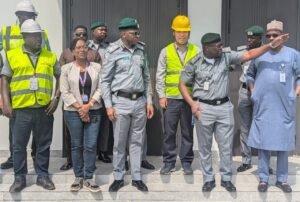
Oshoba verifies scanner integration in Apapa port
Lagos, Nov. 6, 2025, The Customs Area Controller, Apapa Command, Comptroller Emmanuel Oshoba, has confirmed that the new electronic scanner integration at Apapa Port can process 200 containers per hour.
Oshoba made this known during the final test run of the scanner to ascertain its readiness for inauguration at the Apapa Port Complex on Thursday.
Customs conducted a full test run of the newly installed scanners at APM Terminals, marking the final step before full deployment.
Oshoba led the exercise alongside technical teams, scanner operators, ICT personnel, and representatives of the modernisation project. He stated that operations could now commence fully.
He explained that the scanners would enable a paperless clearance process, with scanned images automatically matched to electronic declarations without the need for physical document submission.
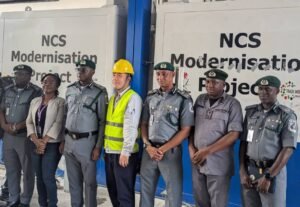
“We will now operate a paperless system where every scanned image matches the declaration. Once captured, the system analyses and releases the cargo promptly,” Oshoba said.
He stressed that compliance was crucial, adding that once a container was scanned and its contents recorded, Customs could not be blamed for any delay.
“Stakeholders must comply because the system displays everything. Information is transmitted electronically to Abuja with recommendations and without human interference,” he added.
Oshoba said delays would only occur when discrepancies arose between declarations and scanned images during the clearance process.
He noted that the automated and analytical nature of the system would improve the Command’s time release performance and bolster national security.
“With these scanners, illicit drugs or ammunition will be easily detected. Even a hidden pistol will appear clearly. It strengthens security and supports modernisation,” he stated.
Oshoba said the project aligned with the Comptroller-General’s commitment to full digitalisation across Customs operations nationwide.
“From experience, most smugglers conceal contraband goods, but the system automatically detects such discrepancies and flags them for physical examination,” he added.
He said the Command was moving away from manual processes as ASYCUDA operations had now been fully integrated with scanning technology for improved trade facilitation.
The Apapa CAC noted that Customs tariff declaration procedures helped officers identify the nature of agents’ declarations during clearance processes.
He urged stakeholders to support the initiative to make Nigerian ports the preferred ports of origin and destination in West and Central Africa.
Oshoba declared that the Command was ready for full deployment following the successful completion of final technical validation tests.
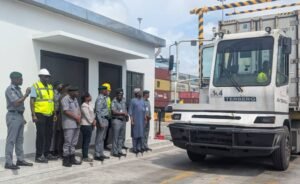
The Deputy Comptroller in charge of the Scanning Unit, Umar Madugu, explained the system’s capabilities, noting that it could process about 200 containers daily when fully operational.
The Thursday’s exercise covered image capture, data transmission, system communication, and fault-tolerant mechanisms as part of final operational testing.
Madugu revealed that the scanner had an internal camera to enhance image quality and detect any infraction or concealment within containers.
“Prohibited items depend on specific country requirements. Once such goods are detected, we conduct 100 per cent physical examination,” he said.
Project Manager for Nuctech Company Ltd., Mr Niu Chao, said scanned images first migrate to a central cloud system in Abuja before being displayed locally for analysis.
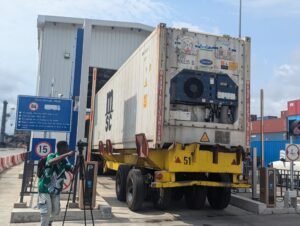
“All images are sent to Abuja’s central image analysis workstation. They are stored in the cloud and made available to local operators across the country.
“In case of network failure, the system has local analysis capability that allows operations to continue seamlessly,” he explained.
The deployment of the scanners is expected to shorten clearance times, reduce physical examinations, and enhance the detection of prohibited imports.
The Trade Modernisation Project Stakeholder Engagement Lead, Mrs Chinedu Bamidele, said she was optimistic about 24-hour cargo clearance once operations begin.
“It is exciting that everything is in place to commence operations. Our main concern is resistance from those unwilling to allow this project to take off,” she said.
Officials from the modernisation project and terminal representatives were present during the simulation exercise to monitor workflow.
The final test run was conducted to assess the readiness of the system before the commencement of full-scale operations at the Apapa Port.
